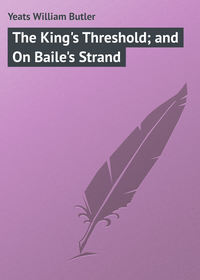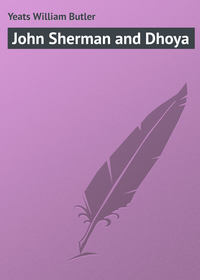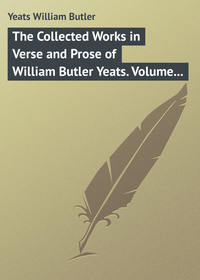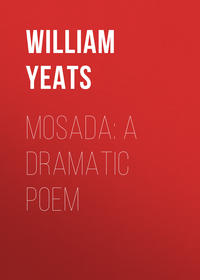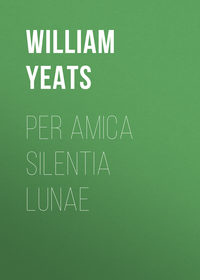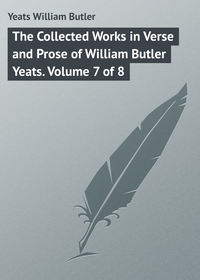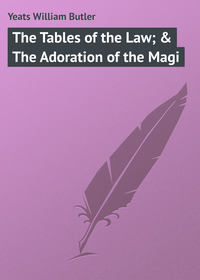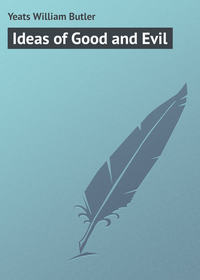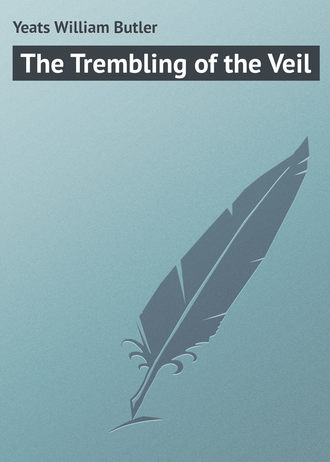 полная версия
полная версияThe Trembling of the Veil
XXIII
If abstraction had reached, or all but reached its climax, escape might be possible for many, and if it had not, individual men might still escape. If Chaucer’s personages had disengaged themselves from Chaucer’s crowd, forgot their common goal and shrine, and after sundry magnifications became each in turn the centre of some Elizabethan play, and had after split into their elements and so given birth to romantic poetry, must I reverse the cinematograph? I thought that the general movement of literature must be such a reversal, men being there displayed in casual, temporary, contact as at the Tabard door. I had lately read Tolstoy’s Anna Karenina and thought that where his theoretical capacity had not awakened there was such a turning back: but a nation or an individual with great emotional intensity might follow the pilgrims as it were to some unknown shrine, and give to all those separated elements and to all that abstract love and melancholy, a symbolical, a mythological coherence. Not Chaucer’s rough tongued riders, but rather an ended pilgrimage, a procession of the Gods! Arthur Symons brought back from Paris stories of Verhaeren and Maeterlinck, and so brought me confirmation, as I thought, and I began to announce a poetry like that of the Sufi’s. I could not endure, however, an international art, picking stories and symbols where it pleased. Might I not, with health and good luck to aid me, create some new Prometheus Unbound; Patrick or Columbkil, Oisin or Fion, in Prometheus’ stead; and, instead of Caucasus, Cro-Patric or Ben Bulben? Have not all races had their first unity from a polytheism, that marries them to rock and hill? We had in Ireland imaginative stories, which the uneducated classes knew and even sang, and might we not make those stories current among the educated classes, rediscovering for the work’s sake what I have called “the applied arts of literature,” the association of literature, that is, with music, speech, and dance; and at last, it might be, so deepen the political passion of the nation that all, artist and poet, craftsman and day-labourer would accept a common design? Perhaps even these images, once created and associated with river and mountain, might move of themselves and with some powerful, even turbulent life, like those painted horses that trampled the rice fields of Japan.
XXIV
I used to tell the few friends to whom I could speak these secret thoughts that I would make the attempt in Ireland but fail, for our civilization, its elements multiplying by division like certain low forms of life, was all-powerful; but in reality I had the wildest hopes. To-day I add to that first conviction, to that first desire for unity, this other conviction, long a mere opinion vaguely or intermittently apprehended: Nations, races, and individual men are unified by an image, or bundle of related images, symbolical or evocative of the state of mind, which is of all states of mind not impossible, the most difficult to that man, race, or nation; because only the greatest obstacle that can be contemplated without despair, rouses the will to full intensity.
A powerful class by terror, rhetoric, and organized sentimentality, may drive their people to war but the day draws near when they cannot keep them there; and how shall they face the pure nations of the East when the day comes to do it with but equal arms? I had seen Ireland in my own time turn from the bragging rhetoric and gregarious humour of O’Connell’s generation and school, and offer herself to the solitary and proud Parnell as to her anti-self, buskin following hard on sock, and I had begun to hope, or to half hope, that we might be the first in Europe to seek unity as deliberately as it had been sought by theologian, poet, sculptor, architect, from the eleventh to the thirteenth century. Doubtless we must seek it differently, no longer considering it convenient to epitomize all human knowledge, but find it we well might could we first find philosophy and a little passion.
BOOK II
IRELAND AFTER THE FALL OF PARNELL
I
A couple of years before the death of Parnell, I had wound up my introduction to those selections from the Irish novelists with the prophecy of an intellectual movement at the first lull in politics, and now I wished to fulfil my prophecy. I did not put it in that way, for I preferred to think that the sudden emotion that now came to me, the sudden certainty that Ireland was to be like soft wax for years to come, was a moment of supernatural insight. How could I tell, how can I tell even now?
There was a little Irish Society of young people, clerks, shop boys, and shop girls, called “The Southwark Irish Literary Society,” and it had ceased to meet because the girls got the giggles when any member of the Committee got up to speak. Every member of it had said all he had to say many times over. I had given them a lecture about the falling asunder of the human mind, as an opening flower falls asunder, and all had professed admiration because I had made such a long speech without quotation or narrative; and now I invited the Committee to my father’s house at Bedford Park, and there proposed a new organization, “The Irish Literary Society.” T. W. Rolleston came to that first meeting, and it was because he had much tact, and a knowledge of the technical business of committees, that a society was founded which was joined by every London-Irish author and journalist. In a few months somebody had written its history, and published that history, illustrated by our portraits, at a shilling. When it was published I was in Dublin, founding a society there called “The National Literary Society,” and affiliating it with certain Young Ireland Societies in country towns which seemed anxious to accept its leadership. I had definite plans; I wanted to create an Irish Theatre; I was finishing my Countess Cathleen in its first meagre version, and thought of a travelling company to visit our country branches; but before that there must be a popular imaginative literature. I arranged with Mr. Fisher Unwin and his reader, Mr Edward Garnett – a personal friend of mine – that when our organization was complete Mr Fisher Unwin was to publish for it a series of books at a shilling each. I told only one man of this arrangement, for after I had made my plans I heard an alarming rumour. Old Sir Charles Gavan Duffy was coming from Australia to start an Irish publishing house, and publish a series of books, and I did not expect to agree with him, but knew that I must not seek a quarrel. The two societies were necessary because their lectures must take the place of an educated popular press, which we had not, and have not now, and create a standard of criticism. Irish literature had fallen into contempt; no educated man ever bought an Irish book; in Dublin Professor Dowden, the one man of letters with an international influence, was accustomed to say that he knew an Irish book by its smell, because he had once seen some books whose binding had been fastened together by rotten glue; and Standish O’Grady’s last book upon ancient Irish history – a book rather wild, rather too speculative, but forestalling later research – had not been reviewed by any periodical or newspaper in England or in Ireland.
At first I had great success, for I brought with me a list of names written down by some member of the Southwark Irish Literary Society, and for six weeks went hither and thither appealing and persuading. My first conversation was over a butter-tub in some Dublin back street, and the man agreed with me at once; everybody agreed with me; all felt that something must be done, but nobody knew what. Perhaps they did not understand me, perhaps I kept back my full thoughts, perhaps they only seemed to listen; it was enough that I had a plan, and was determined about it. When I went to lecture in a provincial town, a workman’s wife, who wrote patriotic stories in some weekly newspaper, invited me to her house, and I found all her children in their Sunday best. She made a little speech, very formal and very simple, in which she said that what she wrote had no merit, but that it paid for her children’s schooling; and she finished her speech by telling her children never to forget that they had seen me. One man compared me to Thomas Davis, another said I could organise like Davitt, and I thought to succeed as they did, and as rapidly. I did not examine this applause, nor the true thoughts of those I met, nor the general condition of the country, but I examined myself a great deal, and was puzzled at myself. I knew that I was shy and timid, that I would often leave some business undone, or purchase unmade, because I shrank from facing a strange office or a shop a little grander than usual, and yet, here was I delightedly talking to strange people every day. It was many years before I understood that I had surrendered myself to the chief temptation of the artist, creation without toil. Metrical composition is always very difficult to me, nothing is done upon the first day, not one rhyme is in its place; and when at last the rhymes begin to come, the first rough draft of a six-line stanza takes the whole day. At that time I had not formed a style, and sometimes a six-line stanza would take several days, and not seem finished even then; and I had not learnt, as I have now, to put it all out of my head before night, and so the last night was generally sleepless, and the last day a day of nervous strain. But now I had found the happiness that Shelley found when he tied a pamphlet to a fire balloon.
II
At first I asked no help from prominent persons, and when some clerk or shop-assistant would say “Dr So-and-so or Professor So-and-so will have nothing to do with us” I would answer, “When we prove we can gather sheep shepherds will come.” Presently, come they did, old, middle-aged, or but little older than myself, but all with some authority in their town: John O’Leary, John F. Taylor, and Douglas Hyde, and Standish O’Grady, and of these much presently; Dr. Sigerson who has picked a quarrel with me and of whom I shall say nothing that he may not pick another; Count Plunkett, Sinn Feiner of late and Minister of Dail Eireann; Dr. Coffey, now head of the National University; George Coffey, later on Curator of the Irish Antiquities at the Museum of the Royal Dublin Society; Patrick J. McCall, poet and publican of Patrick Street, and later member of corporation; Richard Ashe King, novelist and correspondent of Truth, a gentle, intelligent person, typical of nothing; and others, known or unknown. We were now important, had our Committee room in the Mansion House, and I remember that the old Mansion House butler recognised our importance so fully, that he took us into his confidence once in every week, while we sat waiting for a quorum. He had seen many Lord Mayors, and remembered those very superior Lord Mayors who lived before the extension of the municipal franchise, and spoke of his present masters with contempt. Among our persons of authority, and among the friends and followers they had brought, there were many who at that time found it hard to refuse if anybody offered for sale a pepper-pot shaped to suggest a round tower with a wolf-dog at its foot, and who would have felt it inappropriate to publish an Irish book, that had not harp and shamrock and green cover, so completely did their minds move amid Young Ireland images and metaphors, and I thought with alarm of the coming of Sir Charles Gavan Duffy; while here and there I noticed that smooth, smiling face that we discover for the first time in certain pictures by Velasquez; all that hungry, mediaeval speculation vanished, that had worn the faces of El Greco and in its place a self-complacent certainty that all had been arranged, provided for, set out in clear type, in manual of devotion or of doctrine. These, however, were no true disciples of Young Ireland, for Young Ireland had sought a nation unified by political doctrine, a subservient art and letters aiding and abetting. The movement of thought, which had in the ’fifties and ’fourties at Paris and London and Boston, filled literature, and especially poetical literature with curiosities about science, about history about politics, with moral purpose and educational fervour – abstractions all – had created a new instrument for Irish politics, a method of writing that took its poetical style from Campbell, Scott, Macauley, and Beranger, with certain elements from Gaelic, and its prose style – in John Mitchell, the only Young Ireland prose writer who had a style at all – from Carlyle. To recommend this method of writing as literature without much reservation and discrimination I contended was to be deceived or to practice deception. If one examined some country love-song, one discovered that it was not written by a man in love, but by a patriot who wanted to prove that we did indeed possess, in the words of Daniel O’Connell, “the finest peasantry upon earth.” Yet one well-known anthology was introduced by the assertion that such love-poetry was superior to “affected and artificial” English love-songs like “Drink to me only with thine eyes” – “affected and artificial,” the very words used by English Victorians who wrote for the newspapers to discourage capricious, personal writing. However, the greater number even of those who thought our famous anthology, The Spirit of the Nation, except for three or four songs, but good election rhyme, looked upon it much as certain enlightened believers look upon the story of Adam and Eve and the apple, or that of Jonah and the whale, which they do not question publicly, because such stories are an integral part of religion to simple men and women. I, upon the other hand, being in the intemperance of my youth, denied, as publicly as possible, merit to all but a few ballads translated from Gaelic writers, or written out of a personal and generally tragic experience.
III
The greater number of those who joined my society had come under the seal of Young Ireland at that age when we are all mere wax; the more ambitious had gone daily to some public library to read the bound volumes of Thomas Davis’s old newspaper, and tried to see the world as Davis saw it. No philosophic speculation, no economic question of the day, disturbed an orthodoxy which, unlike that of religion had no philosophic history, and the religious bigot was glad that it should be so. Some few of the younger men were impatient, and it was these younger men, more numerous in the London than in the Dublin Society, who gave me support; and we had been joined by a few older men – some personal friends of my own or my father – who had only historical interest in Thomas Davis and his school. Young Ireland’s prose had been as much occupied with Irish virtue, and more with the invader’s vices, than its poetry, and we were soon mired and sunk into such problems as to whether Cromwell was altogether black, the heads of the old Irish clans altogether white, the Danes mere robbers and church burners (they tell me at Rosses Point that the Danes keep to this day the maps of the Rosses fields they were driven out of in the 9th century, and plot their return) and as to whether we were or were not once the greatest orators in the world. All the past had been turned into a melodrama with Ireland for blameless hero and poet, novelist and historian had but one object, that we should hiss the villain, and only a minority doubted that the greater the talent the greater the hiss. It was all the harder to substitute for that melodrama a nobler form of art, because there really had been, however different in their form, villain and victim; yet fight that rancour I must, and if I had not made some head against it in 1892 and 1893 it might have silenced in 1907 John Synge, the greatest dramatic genius of Ireland. I am writing of disputes that happened many years ago, that led in later years to much bitterness, and I may exaggerate their immediate importance and violence, but I think I am right in saying that disputes about the merits of Young Ireland so often interrupted our discussion of rules, or of the merit of this or that lecturer, and were so aggravated and crossed by the current wrangle between Parnellite and anti-Parnellite that they delayed our public appearance for a year. Other excited persons, doubtless, seeing that we are of a race intemperate of speech, had looked up from their rancours to the dead Lord Mayors upon the wall, superior men whose like we shall not see again, but never, I think, from rancours so seemingly academic. I was preparing the way without knowing it for a great satirist and master of irony, for master works stir vaguely in many before they grow definite in one man’s mind, and to help me I had already flitting through my head, jostling other ideas and so not yet established there, a conviction that we should satirize rather than praise, that original virtue arises from the discovery of evil. If we were, as I had dreaded, declamatory, loose, and bragging, we were but the better fitted, that once declared and measured, to create unyielding personality, manner at once cold and passionate, daring long premeditated act; and if bitter beyond all the people of the world, we might yet lie, that too declared and measured, nearest the honeyed comb: —
“Like the clangour of a bellSweet and harsh, harsh and sweet,That is how he learnt so wellTo take the roses for his meat.”IV
There were others with followers of their own, and too old or indifferent to join our society. Old men who had never accepted Young Ireland, or middle-aged men kept by some family tradition to the school of thought before it arose, to the Ireland of Daniel O’Connell and of Lever and of Thomas Moore, convivial Ireland with the traditional tear and smile. They sang Moore’s Melodies, admitted no poetry but his, and resented Young Ireland’s political objections to it as much as my generation’s objection to its artificial and easy rhythm; one, an old commercial traveller, a Gaelic scholar who kept an erect head and the animal vigour of youth, frequented the houses of our leading men, and would say in a loud voice, “Thomas Moore, sir, is the greatest heroic poet of ancient or modern times.” I think it was the Fire Worshippers in Lalla Rookh that he preferred to Homer; or, jealous for the music of the Melodies, denounce Wagner, then at the top of his vogue; “I would run ten miles through a bog to escape him,” he would cry. Then there was a maker of tombstones of whom we had heard much but had seen little, an elderly fighting man, lately imprisoned for beating a wine-merchant. A young member of the London society, afterwards librarian to the National University, D. J. O’Donohue, who had published a dictionary of the Irish poets, containing, I think, two thousand names, had come to Dublin and settled there in a fit of patriotism. He had been born in London, and spoke the most Cockney dialect imaginable, and had picked up – probably from London critics – a dislike for the poetry of Thomas Moore. The tombstone maker invited him to tea, and he arrived with a bundle of books, which he laid beside him upon the table. During tea he began expounding that dislike of his; his host was silent, but he went on, for he was an obstinate little man. Presently the tombstone-maker rose, and having said solemnly, “I have never permitted that great poet to be slandered in my presence,” seized his guest by the back of the collar, and flung him out into the street, and after that flung out the books one after another. Meanwhile the guest – as he himself told the tale – stood in the middle of the street repeating, “Nice way to treat a man in your own ’ouse.”
V
I shared a lodging full of old books and magazines, covered with dirt and dust, with the head of the Fenian Brotherhood, John O’Leary. “In this country,” he had said to me, “a man must have upon his side the Church or the Fenians, and you will never have the Church.” He had been converted to nationality by the poems of Davis, and he wished for some analogous movement to that of Davis, but he had known men of letters, had been the friend of Whistler, and knew the faults of the old literature. We had made him the President of our Society, and without him I could do nothing, for his long imprisonment and longer exile, his magnificent appearance, and, above all, the fact that he alone had personality, a point of view not made for the crowd’s sake, but for self-expression, made him magnetic to my generation. He and I had long been friends, he had stayed with us at Bedford Park, and my father had painted his portrait, but if I had not shared his lodging he would have opposed me. He was an old man, and my point of view was not that of his youth, and it often took me half the day to make him understand – so suspicious he was of all innovation – some simple thing that he would presently support with ardour. He had grown up in a European movement when the revolutionist thought that he, above all men, must appeal to the highest motive, be guided by some ideal principle, be a little like Cato or like Brutus, and he had lived to see the change Dostoievsky examined in The Possessed. Men who had been of his party – and oftener their sons – preached assassination and the bomb; and, worst of all, the majority of his countrymen followed after constitutional politicians who practised opportunism, and had, as he believed, such low morals that they would lie, or publish private correspondence, if it might advance their cause. He would split every practical project into its constituent elements, like a clerical casuist, to find if it might not lead into some moral error; but, were the project revolutionary, he would sometimes temper condemnation with pity. Though he would cast off his oldest acquaintance did he suspect him of rubbing shoulders with some carrier of bombs, I have heard him say of a man who blew himself up in an attempt to blow up Westminster Bridge, “He was not a bad man, but he had too great a moral nature for his intellect, not that he lacked intellect.” He did not explain, but he meant, I suppose, that the spectacle of injustice might madden a good man more quickly than some common man. Such men were of his own sort, though gone astray, but the constitutional politicians he had been fighting all his life, and all they did displeased him. It was not that he thought their aim wrong, or that they could not achieve it; he had accepted Gladstone’s Home Rule Bill; but that in his eyes they degraded manhood. “If England has been brought to do us justice by such men,” he would say, “that is not because of our strength, but because of her weakness.” He had a particular hatred for the rush of emotion that followed the announcement of Gladstone’s conversion, for what was called “The Union of Hearts,” and derided its sentimentality; “Nations may respect one another,” he would say, “they cannot love.” His ancestors had probably kept little shops, or managed little farms in County Tipperary, yet he hated democracy, though he never used the word either for praise or blame, with more than feudal hatred. “No gentleman can be a socialist,” he said, and then, with a thoughtful look, “He might be an anarchist.” He had no philosophy, but things distressed his palate, and two of those things were International propaganda and the Organised State, and Socialism aimed at both, nor could he speak such words as “philanthropy,” “humanitarianism,” without showing by his tone of voice that they offended him. The Church pleased him little better; there was an old Fenian quarrel there, and he would say, “My religion is the old Persian, to pull the bow and tell the truth.” He had no self-consciousness, no visible pride, and would have hated anything that could have been called a gesture, was indeed scarce artist enough to invent a gesture; yet he would never speak of the hardship of his prison life – though abundantly enough of its humours – and once, when I pressed him, replied, “I was in the hands of my enemy, why should I complain?” A few years ago I heard that the Governor of the prison had asked why he did not report some unnecessary discomfort, and O’Leary had said, “I did not come here to complain.” Now that he is dead, I wish that I could question him, and perhaps discover whether in early youth he had come across some teacher who had expounded Roman virtue, but I doubt if I would have learnt anything, for I think the wax had long forgotten the seal – if seal there were. The seal was doubtless made before the eloquent humanitarian ’forties and ’fifties, and was one kind with that that had moulded the youthful mind of Savage Landor. Stephens, the founder of Fenianism, had discovered him searching the second-hand bookstalls for rare editions, and enrolled him in his organization. “You have no chance of success,” O’Leary had said “but it will be good for the morale of the country” (morale was his great word), “and I will join on the condition that I am never asked to enrol anybody.” He still searched the second-hand bookstalls, and had great numbers of books, especially of Irish history and literature, and when I, exhausted over our morning’s casuistry, would sit down to my day’s work (I was writing The Secret Rose) he would make his tranquil way to the Dublin Quays. In the evening, over his coffee, he would write passages for his memoirs upon postcards and odd scraps of paper, taking immense trouble with every word and comma, for the great work must be a masterpiece of style. When it was finished, it was unreadable, being dry, abstract, and confused; no picture had ever passed before his mind’s eye. He was a victim, I think, of a movement where opinions stick men together, or keep them apart, like a kind of bird lime, and without any relation to their natural likes and tastes, and where men of rich nature must give themselves up to an irritation which they no longer recognise because it is always present. I often wonder why he gave me his friendship, why it was he who found almost all the subscribers for my Wanderings of Usheen, and why he now supported me in all I did, for how could he like verses that were all picture, all emotion, all association, all mythology? He could not have approved my criticism either, for I exalted Mask and Image above the 18th century logic which he loved, and set experience before observation, emotion before fact. Yet he would say, “I have only three followers, Taylor, Yeats, and Rolleston,” and presently he cast out Rolleston – “Davitt wants to convert thousands, but I want two or three.” I think that perhaps it was because he no more wished to strengthen Irish Nationalism by second-rate literature than by second-rate morality, and was content that we agreed in that. “There are things a man must not do to save a Nation,” he had once told me, and when I asked what things, had said, “To cry in public,” and I think it probable that he would have added, if pressed, “To write oratorical or insincere verse.”


